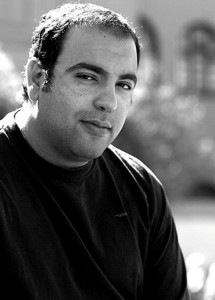
The June 30 revolutionary alliance is made of very strange bedfellows and its reaction to the events that have transpired since reflects its inherent contradictions. The newbie revolutionaries (Independents) are more than ecstatic due their success and are acquiring an ego that rivals those of the Jan 25’s; the social conservatives are jubilant for the reconciliation between the security forces and the population; and the old revolutionaries are divided between those who are equally ecstatic as the newbies and those who are suffering serious depression and are contemplating leaving the country altogether.
They cite three sources of their depression: 1) they are very uncomfortable with what they consider a rise in fascist opinions in post-June 30th Egyptian society, especially in reaction to those calling for “reconciliation” and “inclusion” of the Muslim Brotherhood; 2) they are very unhappy that society seems to be heading mentally to its pre-Jan 25 ways, in regards to military and police worship, and lack of public anger to their use of violence; and 3) they fear that June 30th was designed to erase Jan25 and make it irrelevant, since it gave the only identity they had to, well, everyone, without having them sharing their values.
It’s impossible to put into words the effect the past three years have had on a January 25th revolutionary; traumatised isn’t the right word for it, but it’s the closest one that comes to mind. Their friends were killed in front of their eyes, and many were maimed in clashes with the police, the armed forces and the Brotherhood; hundreds were arrested on false crimes, thousands tried in military courts, and no justice was reached for anyone involved until now. They suspected themselves caught between a population that truly doesn’t care about accountability for the dead, and a media that would only tell their story for sensationalism and ratings, but not for justice. They kept on the fight, with many stating that the population has changed, and that those who saw terror under Brotherhood rule would now know better than to continue to live this way, but the majority kept their suspicion that such things would never change.
The Republican Guards clash that left over 51 Brotherhood supporters dead, the vicious attack they have received as “Brotherhood sympathisers” for criticising it, and the lack of public outrage about it has seemingly confirmed all of their suspicions, and has driven them deeper down that black hole of despair and helplessness that has been plaguing them lately. This is precisely because of the fourth source of depression that they don’t cite, but encompasses the other three: they believe they have been utterly sidelined, and that they have very little influence over public opinion or driving the events at this specific moment. Their first three sources of depression are, in my opinion, not necessarily true, but the fourth most definitely is, and the reason for that is connected to how they handled, or rather mishandled, their revolution, which has lead us all to this very moment.
The historical rules of revolutions state that whoever starts a revolution either rules or will be toppled, in the sense that it is his duty to rule, and that he doesn’t have the option to leave power. Revolutions are not acts of luxury or humour started by protesters in the streets and then abandoned because they no longer feel like partaking in it. A revolution has objectives, attracts like-minded forces, destroys foundations and provokes enemies. It’s a ship that cannot be abandoned until it reaches its harbour, and not unlike a war, you either come out of it victorious or defeated.
The January 25th revolutionaries didn’t fight for power, and wasted every opportunity they had to be part of the ruling process, out of fear of appearing opportunists in pursuit of power. They preferred the notion that the street should rule, which is idealistic but not practical, since a) they don’t own the street, which has since been swayed by other forces; and b) the power vacuum they left on top by their reluctance to be part of that process had to be filled by someone, and it ended up in the hands of the Supreme Council of the Armed Forces and the Brotherhood, neither of which shared their values or beliefs. They demanded justice, freedom and equality, with no clear plan as to how to achieve any of it, and thus left those demands to the interpretation of whoever was on top, which were never aligned with the revolutionaries in any way, shape or form. This only increased their anger and radicalisation, and created the rifts between them and the independents that they still suffer from today.
30 June was supposed to heal this rift, but it was an alliance of hatred towards the Brotherhoood rather than ideals, and the final victory was denied to them by the army, which deposed Morsi and got all the credit instead of those millions that went down to the streets. Suddenly, they find themselves in the midst of a revolution that aims to forget the past three years, with all of its deaths and injustice, like it was a bad dream, and where the security forces’ hands were not only washed clean, but they were the country’s new saviours. Martyrs like Jika, who was a symbol carried by many of the 30 June marches and chants, were immediately swept under the rug, with everyone suddenly praising the police, who were responsible for his death. The newbies, who are the majority, wanted all of this to go away, but no one told the January 25th revolutionaries how exactly to do that, and the memory erasing machine from Eternal Sunshine of the Spotless Mind was nowhere to be found. They were stuck between their horror-filled memories and their cracked psyche, unable to reconcile internally that they inadvertently became allies to the same forces that killed their people.
Feeling tenuous in these post-June 30th times, given how played and dirty they feel, they are now attempting to wash their conscience clean and trying to find a righteous moral position to hide behind utilising their well-honed ability for hyper-intellectualising nuances, only to end up sounding self-righteous and inconsistent in the process. When they condemned the killing of the 51 Brotherhood protesters because murder is wrong, they are immediately reminded that they never condemned the death of a single Brotherhood protester before June 30th in any of the clashes that lead to it. When they promote inclusion of the Brotherhood and Islamists as a way of healing the new growing rift in society, they are reminded of how mercilessly sought the exclusion of anyone they even remotely suspected to have ties to the Mubarak regime and were publically debating until the last minute marching with them on June 30th. When they criticise the rising “fascism” in post-30-June society, they are immediately reminded that they had acted the same way right after 25 January in every respect and never apologised once for it. Day after day, they are reminded that they can’t walk away clean from this, as if it’s possible to walk away from wars without losing much of your humanity.
That being said, there is a reason why I said the three sources of depression were not necessarily true: First of all, their calls for reconciliation are not wrong, but are simply ill-timed. In order for reconciliation to happen: a) the other party must want to reconcile, which so far they obviously don’t; b) based on historical and political definitions, both sides must be done providing martyrs for their cause, which neither side has; and c) when revolutions happen, there is a winning side and a losing side, and people who overthrew their dictators are under no obligation to reconcile with them before some sort of justice is served, which so far hasn’t happened. Secondly, once the dust settles with the conflict with the Brotherhood, there will be no going back to the pre-Jan 25 days, whether society wants to or not, because public accountability is now in the minds of the population, and the security forces know this and the next elected government knows this. They now know that if they don’t work for the people, they will face a population that crushed three regimes in less than three years, and a country with such a fragile economy and infrastructure that there is literally no room for error, let alone the blatant corruption of the NDP or the Brotherhood. Whoever comes will have to be open to new and revolutionary ideas, even if they are conservative, because the situation demands it. And even if the population may want to forget the past three years, those who will get into power will never forget this. The days of autocratic rule, for better or worse, are over. Believe it.
As for the erasure of Jan 25, in case you haven’t noticed from the chants, the marches, the dress codes, or hell, even the current interim government, June 30th derives its legitimacy from Jan 25, even if some forces in it would really want 25 January erased. And in reality, June 30th did give the Jan 25 bug to a good portion of the population; like we did, they believe they have brought down a regime; like we did, they believe they have done it for freedom, justice and equality. In reality, it would have served those who are whining now to treat June 30th as a recruitment drive, instead of an existential threat. But that would require strategic thinking from the January 25th figures, which they are not the best at. They are all passion and heart, but, obviously, not big on strategy. Consider this: they had three enemies – old regime forces, security forces and the Brotherhood – and June 30th sidelined the first and now has the second fighting the third. And they are complaining. It’s amazing.
So, maybe they are no longer as relevant as they used to be, or maybe they can’t play their roles anymore, but that’s not necessarily a bad thing. It’s time for the second and the third generation to take over, and for them to finally rest and consider what they should do with their lives. Better than anyone, they know the challenges ahead, and they know the issues and the missing institutions that those generations will need, if someone in a few years entertains the notion of becoming a dictator in Egypt once again. They can become the guardians of the next generations, they can create the institution of civil society and accountability that we obviously need in this country, they can finally pursue all of the projects they wanted to pursue when Jan 25 first happened and had to ignore due to what transpired, or they can finally go and try to have a normal life for a while, whatever that may be. For the first time in three years they are finally free, and there are legions of others willing to take over their mantle and continue this fight. And that is nothing to be depressed about.



